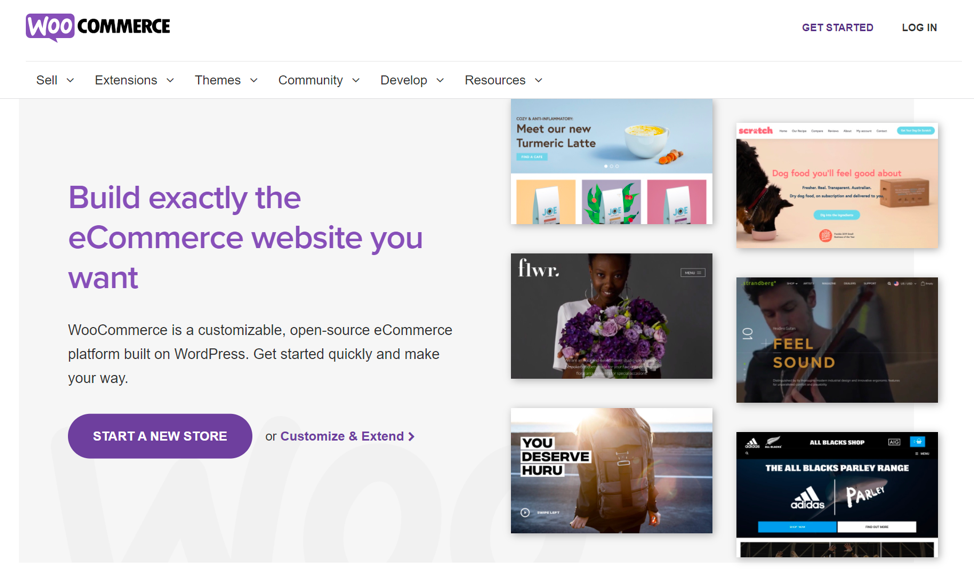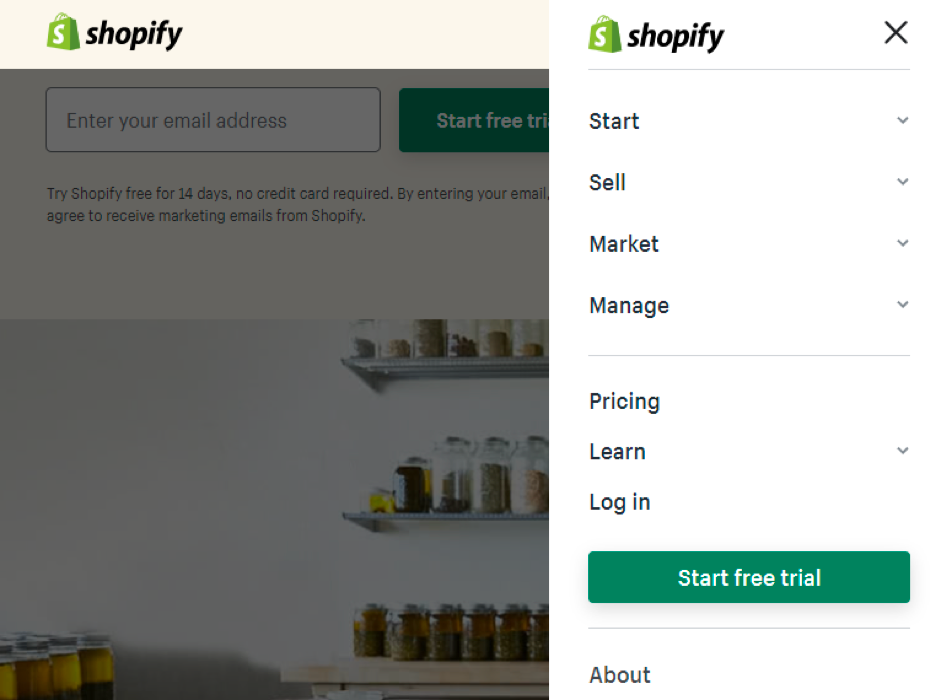Are you starting an online store and trying to compare WooCommerce vs Shopify? Both platforms are widely known in the ecommerce realm for good reason. Both power thousands of online stores, making it difficult to tell whether Shopify or WooCommerce is more popular.
Regardless of popularity, determining which platform is right for your business depends on your needs. Here we’ll cover what each of these ecommerce platforms is, compare features, and help you determine whether WooCommerce or Shopify is right for your business.
What is WooCommerce?
First you may be wondering, What is WooCommerce?
WooCommerce is an open-source, customizable ecommerce platform built on WordPress. By adding the WooCommerce plugin to any WordPress site, you can set up a self-hosted online store for free. A multitude of additional features and extensions are available that allow you to customize and increase the functionality of your site.

What is Shopify?
Shopify is an all-in-one ecommerce platform that hosts your online store and allows you to build your store using its templates. There is no need to manage a website in terms of web hosting, security, and other technical specifics because when you create an online store with Shopify, the platform handles these aspects.

Now that we know the basics of WooCommerce vs. Shopify, let’s delve into the specific features that differentiate these two ecommerce platforms.
WooCommerce Features
Let’s review some of the key features of WooCommerce to help you determine if it suits your needs.
Cost
One of the main benefits of using WooCommerce for your online store is the cost. This open-source, customizable platform is free. You do, however, need to consider the fixed costs needed to run this platform such as:
- Hosting fees
- Your domain
- Payment gateway cost
Depending on what features you select, you may also want to purchase additional items to customize your store, including:
- Premium theme
- Premium plugins
Keep in mind that WordPress plugins may only be a one-time purchase, while Shopify apps may result in recurring monthly payments.
Ease of Use
WooCommerce is a plugin rather than a hosted platform, which means you need to install it, and source web hosting and security. Overall, WooCommerce requires you to be more hands-on with the management of your website, which includes attending to WooCommerce maintenance. While this platform may require more from you, it allows you much greater flexibility and control.
Plugins
The open-source platform nature of WooCommerce lets it shine when it comes to plugins. Over 50,000 plugins are available which makes building a custom website an attainable dream. You can customize your WooCommerce product pages in a variety of ways and there are multiple plugins to choose from for configuring WooCommerce cart abandonment and many other site functionalities.
Dropshipping
Dropshipping capabilities are easily attained with WooCommerce because extensions allow for effortless order fulfillment, instant product imports, and more. Beyond that, you can allow other vendors to sell their products on your ecommerce marketplace.
One thing to consider when setting up a WooCommerce dropshipping store is whether your supplier and vendor have minimum order requirements or fees associated with their services.
Scalability
As your ecommerce store grows, WooCommerce can grow with you. Although you’ll need to manage aspects like updates, backups, hosting plan upgrades, and security, you have complete control of your website and pay only for the resources you need.
In addition, there are WooCommerce sales plugins to help you increase your sales as well as managed WordPress hosting providers available to help you scale your store.
Support
WooCommerce has a plethora of support options directly on its website, including helpful documentation, tutorials, and guides. You can also find answers to your questions from other WooCommerce users and experts on their support forums.
Shopify Features
Now, let’s review how the same features compare with an ecommerce site using Shopify.
Cost
Shopify offers a three-tier core pricing structure with clear information about what features are included with each plan. The three plans are:
- Basic Shopify for $29/month
- Shopify for $79/month
- Advanced Shopify for $299/month
If you decide to expand on the features included with any of the above plans, your cost may increase. This includes adding:
- Premium themes
- Apps that incur a monthly fee
- Using an external payment gateway
Ease of Use
A fully hosted platform, Shopify requires minimal setup effort and you do not need to concern yourself with installing or managing any software. There is also no need to worry about hosting, security, backups, or performance.
You sign up for an account and are walked through the process of designing your website and adding products to your store. The interface is intuitive and easy to use with drag and drop options.
One reservation you may have about Shopify, however, is that as easy as it is to use, your options are limited to the tools provided within the platform or add-ons from the Shopify marketplace. Depending on how much flexibility you need, this may or may not work for your ecommerce store.
Plugins
Shopify plugins are reliable, and there are over 1,200 free and paid apps available to let you customize your store.
Dropshipping
Shopify allows you to provide dropshipping by either manually placing the order with your vendor or integrating one of several apps for a dropshipping marketplace like Oberlo, Printify, AliExpress, or others. Consider the membership fees, shipping, and other potential charges that come with these marketplaces.
Scalability
Scaling your business is made easy with Shopify because as your business grows, your plan can be upgraded to match your store’s needs. While you won’t need to configure the technical aspects of your store, by letting Shopify handle the infrastructure upgrades, your monthly price increases.
Support
Support is provided by Shopify and is offered 24/7 by live chat, email, Twitter, and phone. If you prefer to fix things yourself, the platform also offers how-to guides, documentation, video tutorials, a knowledge base, and forums where you can ask questions and find answers.
In addition, the platform provides a directory of Shopify Experts available for hire if you want to integrate a third-party solution or need additional help.
How to Choose Between WooCommerce & Shopify
To choose between these two ecommerce platforms, consider the each of following factors:
Business Size
When evaluating WooCommerce vs Shopify, consider the size of your business and how that relates to your online store needs.
WooCommerce is an open-source platform that allows you to integrate ecommerce within your existing WordPress website. The customization factor is huge because you can tailor your WooCommerce store to however small or large your business is.
Shopify offers three base plans, and certain plans may offer more than you need if you’re running a small business.
Revenue
Business revenue is another factor to think about when comparing Shopify vs. WooCommerce.
While both platforms apply bank charges and payment provider charges from providers like PayPal or Stripe, Shopify also applies their own 2% transaction fee if you use a third-party gateway. This percentage may seem small, but it adds up when it applies to all of your revenue.
In comparison, WooCommerce does not charge its own transaction fees and lets you use a third-party gateway without additional fees. If your business wants to use specific, or even obscure or regional payment services, you can save money with WooCommerce vs. Shopify.
Shipping Methods
Consider your shipping method needs when selecting Shopify or WooCommerce.
Both ecommerce options let you set shipping costs based on certain parameters such as the size and weight of the products. However, if you want real-time calculations of shipping costs with specific shippers, you’ll need to purchase a plugin Shopify requires you to purchase, and at minimum, the Advanced Shopify plan for these capabilities, which comes with a higher cost.
Design Options
When trying to decide whether WooCommerce or Shopify is right for you, determine what design options your business needs for your ecommerce site.
There are limited options (over 50, about 10 of which are free) with Shopify vs WooCommerce, which offers thousands of store designs to find the best WooCommerce themes to match your desired look.
Bottom Line
Consider all of these factors when comparing WooCommerce vs Shopify. After all, deciding which ecommerce platform is right for your business is an important strategic business decision. While Shopify may provide a straightforward turnkey solution, WooCommerce delivers the ultimate in customization options if you are comfortable being more hands-on.
If the benefits of WooCommerce appeal to you, but you’d like to make setting up your store easier, you have options. Look into StoreBuilder, which lets you create a unique online store powered by WooCommerce, with no coding required.

